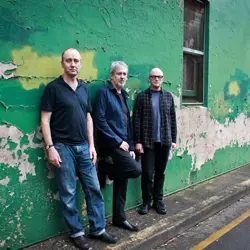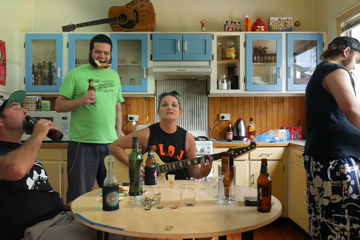 The Necks
The NecksWhereas your average successful band enjoys a big hit single early on, a reputable first album and a couple of big tours before commencing a slow, irreversible spiral into oblivion, The Necks success has snowballed from very humble, outsider origins to international acclaim, collaborations with the likes of Brian Eno, kudos from the likes of Nick Cave and some nights at swanky venues such as the Sydney Opera House.
“The career of The Necks is a bit like our music in that we never really force it or hurry it,” drummer/percussionist Tony Buck explains. Forming in 1987, their 1989 record Sex eventually became their first American release in 1996. Even then it didn't set too many tongues wagging. Europe was slightly quicker to catch on, but the Necks didn't set foot on US soil until 2001. They have now toured the States three times in the last two years, and with a revered 16 album catalog that explores territory other bands can barely conceive let alone explore, the band is happy with the opportunities now knocking.
The group has had to weather not only the test of time but the tyranny of distance too, as Buck hasn't lived in Australia for 20 years. Now based in Berlin, having become frustrated with Tokyo and Amsterdam, he struggles with languages but finds Europe a great base to work with other on his side projects. The Necks however, “set aside periods and make the most of the time that we have. We tend to do that maybe four times a year for three week periods.”
That being the case, there must be some irresistible glue that keeps the group together. “I think we all feel that with The Necks we've struck on a way of playing music together that's really quite unique,“ Buck claims with conviction. “I think we all know that and it satisfies a lot of things that we're interested in and it's open enough to take in new influences, things that we draw on from other projects that we're involved in. It's pretty clear what it is, it's also quite adaptable without being diluted in concept. I think we realise that it's quite a special thing, so it's always a joy to come back to it.” Furthermore, Buck believes their resilience also derives from “an equal relationship with the three of us, with equal input and we also equally benefit from everything the group does. We don't do anything that the three of us don't want to do. It's not even like a democracy, it has to be unanimous or we don't do it.”
Don't miss a beat with our FREE daily newsletter
The one patently obvious reason why The Necks might be considered “special” is their singularity. Virtually unclassifiable, Buck struggles to name contemporaries. Essentially an improvisational band with influences from minimalist composers, the music the band creates onstage is entirely different to that of their albums. Live, the band plays unrecorded, entirely improvised sets where, as Buck elucidates, “we improvise without talking to each other about anything. The other part of the band is the studio band where we decide on a sort of direction for a piece of music, and then we utilise all the multi-tracking possibilities of the studio, and sculpt a piece of music out of that, so it's very much a studio composition. They're very different approaches.”
Despite their consistent creativity, The Necks do appear to have one Achilles heel. “We usually take about a week or two to record [an album], a couple of days to mix it and about six months to name it, or sometimes a year,” Buck admits. Really? “I'm serious. We took more than a year to title Hanging Gardens.” Flip, it's a good thing no one in the band tries to write lyrics, otherwise after more than two decades together they might now be finishing off their first song. Good to know their muse has some limitations after all.















